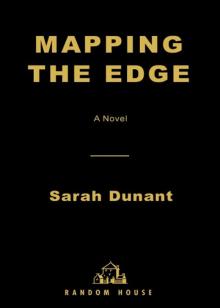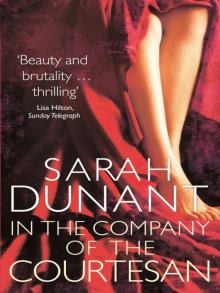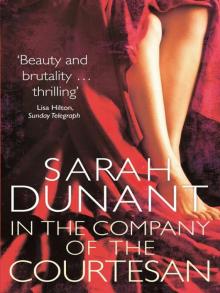- Home
- Sarah Dunant
Birth Marks Page 11
Birth Marks Read online
Page 11
Over the coffee and Calvados we talked about him. My turn to get blood out of a stone. He’d been born and brought up in New York. His father had been a lawyer, but more interested in defending the left than the right, which in fifties America might have been good for the soul but was a lousy way of making a living.
‘When he died in a car crash I was seventeen and there wasn’t much in the bank. My mother’s family had to pick up the pieces. She came back to France, her brother put me through business school.’
‘So when did you leave the States?’
‘Ten years ago.’
‘What happened?’
He played with his brandy glass. ‘Personal stuff.’
‘Does that mean confidential?’ He shrugged. ‘OK. Let’s put it another way. Were you leaving it or going to it?’
And this time he smiled. ‘Leaving it. But only because it was about to leave me.’
‘And now?’
‘Now I work. Like you, I suspect. You want another coffee?’
I glanced down at my watch. It was nearly twelve. Around us the waiter was clearing the other tables. For an exclusive restaurant it was the nearest they would get to a hint. ‘Perhaps we should let them go to bed.’
Freudian slip they call it. Ah well, too late to stop now. He was gentlemanly enough to let it pass without notice. ‘Yes, perhaps we should.’
There followed a little silence, all full of life. He looked at me. I opened my mouth to say something but the words stuck half-way up my gullet. I have always felt sorry for women who blush. It must be a dreadful kind of exposure. I smiled at him. And he smiled back. And I was sure it was a kind of come on. At least it registered as such in the pit of my stomach. What more do you want, Hannah? I thought. If this reticence turns out to be just social cowardice, you’ll be furious with yourself. Go on, say it. All he can do is refuse.
‘It’s been a great evening. D’you feel like making a night of it?’
And he carried on smiling as he shook his head and said, ‘Sorry, Hannah, but there’s someone else I have to see.’
CHAPTER NINE
I slept well, considering. I even remembered to drink a pint of water before going to bed, so that when my wrist started bleeping at 6.00 a.m. it didn’t take the top of my head off with it. I decided to breakfast in my room, with a river of hot coffee and warm croissant. Food for thought.
So what are you waiting for? A couple of paragraphs about how I’d crawled back from the humiliation of the restaurant and cried all night into my pillow? Sorry. If it’s any consolation, if I had done I probably wouldn’t tell you anyway. But in the end it wasn’t that big a deal. Of course it hurt—I mean nobody likes being told they’re resistible—but since when did equality of the sexes mean that women got what they wanted? And when it came to it, sticks and stones…not to mention nothing ventured…and you can’t make an omelette without…A poultice of clichés brought down the swelling. It could have been worse. Counting my blessings, the first was all the information I had got, the second was not having to pay the whole bill. If you think about it, you’d have to be a real louse to turn a lady down then let her pick up the check. Of course I offered, but I also gave in. Just as well. I would hate to think of Miss Patrick having to remortgage her sweet little cottage on the basis of one meal. In the end we went Dutch, which saved face and gave me enough for a taxi home. I left him picking up his coat from the cloakroom. I don’t entirely remember whether I said goodbye. OK—so I was madder than I let on. It’s called sub-text: the art of telling someone what they need to know without using the words. Grown men usually don’t have much trouble with it. But among all the things he had let slip I certainly hadn’t registered the bit about the settled home life or the steady lover. Now, now, Hannah, remember, God helps those…I applied another poultice, got up and headed for the shower. Jiminy was waiting with the towel. I retook my vows of celibacy in the face of duty and we made our peace. Back to work.
I got to the factory just before eight. Roissy was covered in fog, the iron man thrusting his thunderbolt through a pea-souper that might have been weather or industrial pollution. Inside, the Belmont babies were already making things fly. I was impressed. At 8.26 a.m. precisely the receptionist called me over. Would I take the lift to the third floor? Mr Belmont’s assistant would meet me there.
To my shame I was anticipating a man. She was standing in the middle of the corridor, slap bang opposite the lift doors, and even at first glance you wouldn’t have tried to get past her if you didn’t have an appointment; Cerberus at the gates of hell. I followed meekly. At a quick estimate she was at least fifty-five, but her heels were still stiletto sharp and her figure looked as if it had had regular bondage practised on it. According to David Mercot—henceforth to be known as scumbag—Belmont had started his company in the late forties. At which point the dragon would have been just a slip of a girl, eager to make France great again. Maybe she had grown up with the firm. I wondered if she had nursed aspirations to becoming the third Madame Belmont. It might explain her aggression towards women younger than herself.
You couldn’t miss his office. The corridor ended at it, a large dark wooden door with a brass plaque on it, big enough for a coffin lid. Inside the sanctum, an outer guardhouse, Cerberus’ lair. She pointed to a chair and looked at her watch. When the big hand reached the six she pressed a buzzer beneath her desk. Into the intercom she said, ‘Mr Belmont. Your eight-thirty appointment is here.’ He murmured something back. She stood up and motioned me to do the same. Then she opened the door, walked in ahead of me and announced: ‘Mademoiselle Wuulfe.’ I stepped in and the door closed behind me. I looked towards the desk. It was empty.
He was sitting to the side, in a leather armchair, a glass coffee table in front of him. He looked very small, but then the office was very big. I walked across the carpet towards him. He became taller, thinner and older, a strong man felled by an erratic heartbeat. Alec Douglas Home was my first thought—the only British Prime Minister to have a skull for a head and a desiccated manner to go with it. Mummification was my second. He held out his hand. I tried not to grasp it too tightly in case it should crumble into dust. I was looking at a national hero, a man who had carried France out of the ruins of war into the prosperity of the late twentieth century. Three heart attacks later he hardly seemed strong enough to lift his own coffee cup. If it was strange for me, think what it must have been like for him: every morning to find himself lumbered with this body, wondering what happened to the young man with firm hands who laid dynamite tracks across Nazi railroads, always two jumps ahead of the enemy. What did you do in the war, Daddy? And was there really no romance to the suffering? I sort of wished we had the time to talk about it. But we didn’t.
‘Good morning, Miss Wolfe. You will forgive me if I don’t get up to greet you. I am a little indisposed.’ No one would argue with that. Except that close to, above the web of lines and sagging skin, the eyes were still bright, the voice surprisingly strong. In fact beneath the frailty, there was a definite brittle energy to the frame. He reminded me of a plant that needed watering. Maybe if you drenched him in Baby Bio all the parchment would fall away and a younger oilier man would appear. But as it was…? I thought about him and my lovely lithe young dancer. And I just couldn’t see it. All this way on a hunch.
‘You are English. But my assistant tells me you speak commendable French.’
‘I am reasonably fluent, yes.’
‘So I hear. I applaud you. In deference to an old man then we shall speak in my language rather than yours. I must apologize for not seeing you earlier.’
‘I’m grateful you could find the time now.’
‘Yes, well, I gathered from my assistant it was important. So, what can I do for you, Miss Wolfe? On your card it says you are a private investigator. I am a rather public man. What do we have in common?’
I kept it simple. In deference to my French and his age. I implied nothing but the knowledge I didn’t have. I had be
en employed to track down a girl called Carolyn Hamilton who had turned up dead, eight months pregnant. Now my client wanted to know why. To do my job I needed to find out who the father was and where she had spent the last seven months. And via the Potential Employment Agency all roads led to Belmont Aviation. He listened intently, his eyes on my face the whole time. And I found myself thinking about Philip Marlowe and his visits to the ailing General Sternwood, drinking the old man’s best brandy, but unable to give him back the vitality to cope with his wild erring daughters. The Big Sleep. In the end all it brought the General was more grief. And Marlowe never did work out who killed the chauffeur. Private eyes and rich old men: a fatal fictional attraction. Let’s hope Belmont wasn’t interested in storytelling. When I finished he sat back and was silent for a few moments. ‘You may think I’m unforgivably old, Hannah, but believe me I am not stupid’—it had been my mother’s favourite retort during a decade of conflict. It would do me good to remember it now.
‘Tell me, Miss Wolfe, do I gather from this that it was you who called my nephew’s office two days ago?’
Since there was no point in lying I told him it was. ‘I’m sorry he couldn’t help you. In fact, of course, since Carolyn Hamilton was never technically employed by Belmont Aviation he was absolutely correct in what he told you.’
‘But she was employed by you?’ I said quietly, while the massed bands of the Coldstream guards played the ‘Hallelujah Chorus’ in the background.
‘Yes, indeed she was. But very briefly I’m afraid, so I’m not sure how much help I can be to you.’
‘If you could just tell me what happened…’
‘Of course. Well, as you already know from your inquiries I—under the auspices of Belmont Aviation—did advertise a post through the Potential Agency in London. As you will probably have noticed, both the advertisement and the questionnaire were somewhat vague on the exact nature of the employment. No doubt you have your own suspicions as to what the job entailed. I think it will probably help you to tell you the truth. It was not a job strictly connected to the company. It was instead a post inside my own family. What I was looking for was, for want of a better word, a social companion for my wife, Mathilde. I think I owe it to you to explain a little more fully. We have been married, my wife and I, for nearly six years now. During that time we have been trying to have a child. My wife is much younger than I but, alas, medical science is no respecter of age. And after a number of tests, Mathilde has had diagnosed certain problems which have, up until now, prevented her from conceiving. And since my health has deteriorated, well, it has become clear over the last year or so that we must resign ourselves to remaining childless. It has been less of a blow to me than my wife. I had to come to terms with the possibility of this with the death of my son some years ago, and I have always had my work to keep me involved. She, however…well, she has not found it so easy. Her doctor suggested that she go away, travel a little, but since my illnesses she has been unwilling to leave me. Of course she is much younger than I am, and has a good deal of time on her hands, so I—we—thought that perhaps some kind of companion more of her own age might help lift her out of the depression. She speaks excellent English, indeed she was a translator for the company for many years and is very fond of England. Equally, as I’m sure you appreciate, we were not eager to broadcast the news of her condition all over France. By advertising the post in London we felt we could avoid that. I was sure that if we could find the right young person, perhaps with an interest in the same kind of things…Anyway, the response was considerable. Carolyn Hamilton was one of the first we saw. We both liked her right from the start. My wife especially. As a girl she had been very interested in dance, even contemplated it as a career. So, of course, she and Carolyn had immediate things in common.
‘You never met her, I assume? That’s a great shame. She was a very vital young woman, maybe a little headstrong in some ways, but very charming and full of energy. Not unlike Mathilde herself. She also had a sense of adventure. In many ways she was perfect for the job. She seemed eager for a change, some time away to decide on her own future, and to meet other people. Over the course of the next couple of months we saw her a number of times. Each time we became more convinced. At the end of April we offered her the job and she accepted. She came almost immediately. For the first six or eight weeks the arrangement seemed to work very well. Then, quite abruptly, something changed. She became withdrawn, she complained of being tired and she was sick a number of times. Naturally we were worried. My wife even suggested she see a doctor. In the end that was not necessary. You know, of course, what was wrong. When she told us it came as a great shock. Particularly to my wife who was, as you can imagine, very upset. After all she had been through it was a particularly cruel irony. Of course I offered Carolyn whatever financial support she might need, but it was clear that she could not stay with us, it would have been too painful. Neither did she want to. She left, I think, at the beginning of July. Since then we have not heard or spoken to her. Needless to say we have often wondered what happened to her. Now, alas, I know. I can only say how deeply sorry I am. She was far too young for such a tragedy.’
There it was then, the Belmont end of the story all tied up with a neat red bow. She came, she worked and she left. According to the calendar it all fitted. The only obvious question marks were of my own making. The Belmont marital bed was the main one. A desire for children meant sex, him and her. ‘Young, good-looking and devoted’—hadn’t those been Mercot’s words. It was beyond my powers of fantasy. Like imagining one’s parents fucking. But finally that was my problem not his. No doubt when I am his age I too will curse thirty-five-year-olds for believing they have a monopoly on desire. It was certainly no reason to disbelieve him. And I’d had such great hopes of this one. Tough shit, Hannah; since when was it ever handed to you on a plate? So, start working.
‘She didn’t tell you who the father was?’
‘We didn’t ask and she didn’t volunteer.’
‘Did she give you any idea as to whether she was intending to go through with the pregnancy?’
He was silent for a moment. ‘All I can say is she gave us no reason to believe otherwise.’
‘And she didn’t say where she was going?’
‘No.’
‘Can I ask you about money? I gather from her family that she was quite badly in debt before she left England. Did she talk about that at all?’
‘Not in so many words. But we had got the impression that there may have been some money problems, yes.’
‘And did you give her money?’
‘Of course. She was our employee. We paid her in full for the eight weeks she worked for us, and I also gave her six weeks’ salary when she left. I offered more, but she would not accept. I got the impression that the father, whoever he was, could provide for her and I did not like to intrude further.’
‘So how much would you have given her, in total?’
‘Hmmn. Offhand I can’t tell you an exact figure. But I believe we had talked about an annual salary of around three hundred thousand francs. So three and half months of that would have been what—something like a hundred thousand.’
Or ten thousand pounds. Somewhat more than had been deposited in her savings account over those three months, but then she could always have kept some back for rainy days to come. Give or take a few thousand it still added up to a hefty salary for what sounded like a fairly easy job. I said as much and he smiled.
‘Miss Wolfe, as you have probably realized by now, I am a wealthy man. I am used to paying for what I want. And I wanted the right girl. I was willing to make it worth her while.’
‘Do you have any idea what she did with the money?’
He frowned as if the very idea of asking would have been distasteful to him. ‘No, none at all. I simply paid it into a Paris bank account as she requested. From there it was hers to do with as she wished.’
‘And when she left in early July that was the last
you heard from her?’
‘Yes.’
‘And you didn’t find that rather strange? I mean you had been very generous. Didn’t you hope she might keep in touch?’
‘I’m an old man. The ways of young girls are something of a mystery to me. As I mentioned to you, Carolyn had a strong personality. I never for one moment believed that she wouldn’t fall on her feet. To be honest I think I was grateful for her silence. Any news could have only further upset my wife.’
‘And you’re sure that Carolyn never got in touch with her either?’
‘I’m sure. She would have told me if she had.’
‘Does she tell you everything?’
‘I don’t think I…’
‘I just thought…well, you said how fond of Carolyn she had been. I wondered if they might have exchanged words, I mean without your knowing.’
‘Miss Wolfe, I understand your need to find out what happened to this poor girl, but I have told you everything I know. Everything we know. Carolyn Hamilton left here in June and we have heard nothing since. That is the full extent of the help I can give you.’
It was also the first hint that the old man in front of me was more than just Maurice Chevalier on a diet. I left a second’s pause then said quietly, ‘Would it be possible for me to have a word with your wife about all this?’
He smiled. ‘Alas, I’m afraid not. As I’m sure I have made clear, my wife is not a well woman. I wouldn’t want her upset in any way. Particularly since I have kept the news of Carolyn’s death from her.’

 Mapping the Edge
Mapping the Edge The Birth of Venus
The Birth of Venus In the Name of the Family
In the Name of the Family Snowstorms in a Hot Climate
Snowstorms in a Hot Climate In the Company of the Courtesan
In the Company of the Courtesan Birth Marks
Birth Marks Transgressions
Transgressions Under My Skin
Under My Skin Blood & Beauty: A Novel of the Borgias
Blood & Beauty: A Novel of the Borgias Blood & Beauty
Blood & Beauty Sacred Hearts
Sacred Hearts In the Company of the Courtesan: A Novel
In the Company of the Courtesan: A Novel